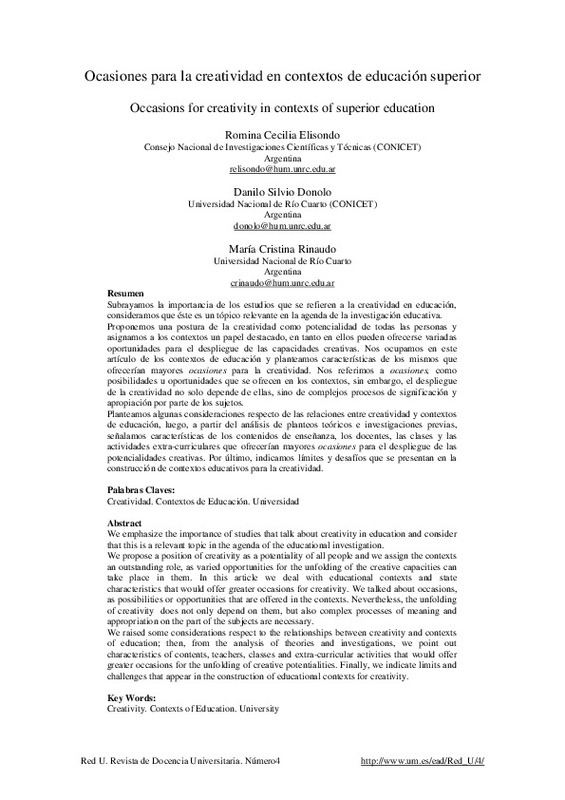Alencar, E. (1997) O estimulo a criatividade no contexto universitario. Psicología Escolar e Educacional, 1 (1): 29-37.
Alencar, E. (2000) O perfil do profesor facilitador e do profesor inibidor da criatividade segundo estudantes de pos-graduacao. Boletim da Academia Paulista de Psicología, 19: 84-95.
Alencar, E. (2002) O Estímulo à Criatividade em Programas de Pós-Graduação segundo seus Estudantes Psicologia. Reflexão e Crítica, 15 (1): 63-69.
[+]
Alencar, E. (1997) O estimulo a criatividade no contexto universitario. Psicología Escolar e Educacional, 1 (1): 29-37.
Alencar, E. (2000) O perfil do profesor facilitador e do profesor inibidor da criatividade segundo estudantes de pos-graduacao. Boletim da Academia Paulista de Psicología, 19: 84-95.
Alencar, E. (2002) O Estímulo à Criatividade em Programas de Pós-Graduação segundo seus Estudantes Psicologia. Reflexão e Crítica, 15 (1): 63-69.
Alencar, E. y D. Fleith (2003) Barreiras à Criatividade Pessoal entre Profesores de Distintos Níveis de Ensino. Psicologia: Reflexão e Crítica, 16 (1): 63-69.
Alencar, E. y D. Fleith (2004) Inventário de Práticas Docentes que Favorecem a Criatividade no Ensino Superior. Psicologia: Reflexão e Crítica, 17 (1): 105-110.
Alonso Monreal, C. (2000) Qué es la creatividad. Biblioteca Nueva. Madrid.
Amabile, T. (1996) Creativity in context. Westview Press. Boulder.
Burnard, P. (2006) Reflecting on the creativity agenda in education. Cambridge Journal of Education, 36 (3): 313-318.
Cheung, C., Rudowicz, E., Xiao Dong, Y. y A. Kwan (2003) Creativity of university students: what is the impact of field and year of study? Journal of Creative Behavior, 37 (1): 42-63.
Cohen, D. (1997) Singapore wants its universities to encourage lives creativity. The Chronicle of Higher Education, Septiembre: 71-72.
Cole, D., Sugioka, H. y L. Yamagata Lynch (1999) Supportive classroom environments for creativity in higher education. Journal of Creative Behavior, 33 (4): 277-293.
Craft, A. (2003) The limits to creativity in education. British Journal of Educational Studies, 51(2): 113-127.
Cropley, A. J. (1997) Fostering creativity in the classroom: general principles. En Runco, M. The creativity research handbook. Hampton Press. Cresskill, NJ.
Csikszeenmihalyi, M. (1998) Creatividad. El fluir y la psicología del descubrimiento y la invención. Paidós. Barcelona.
De La Torre, S. y V. Violant (2002) Estrategias creativas en la enseñanza universitaria. Una investigación con metodología de desarrollo. Creatividad y Sociedad, 3: 21- 38.
Diakidoy, I. y E. Kanari (1999) Student teachers' beliefs about creativity. British Educational Research, 25 (2): 225-243.
Dillon, P. (2006) Creativity, integrativism and a pedagogy of connection. Thinking Skills and Creativity, 1: 69-83.
Entwistle, N. y E. Peterson (2004) Conceptions of learning and knowledge in higher education: relationships with study behavior and influences of learning environments. International Journal of Educacional Research, 41: 407-428.
Guilford, J. (1950) Creativity. American Psychologist, 5: 444-454.
Jeffrey, B. (2006) Creative teaching and learning: towards a common discourse and practice. Cambridge Journal of Education, 36 (3): 399-414.
Jeffrey, B. y A. Craft (2004) Teaching creatively and teaching for creativity: distinctions and relationships. Educational Studies, 30 (1): 77-87.
Kaufman, J. y J. Gabler (2004) Cultural capital and the extracurricular activities of girls and boys in the college attainment process. Poetics, 32: 145-168.
Kazerounian, K. y S. Foley (2007) Barriers to Creativity in Engineering Education: A Study of Instructors and Students Perceptions. Journal of Mechanical Design, 129 (7): 761-768.
Lesgold, A. (2004) Contextual requirements for constructivist learning. International Journal of Educational Research, 41: 495-502.
Lipscomb, S. (2005) Secondary school extracurricular involvement and academic achievement: a fixed effects approach. Economics of Education Review. doi:10.1016/j.econedurev.2006.02.006.
Marín, R. y S. De La Torre (1991) Manual de la Creatividad. Vicens-Vives. Barcelona.
Menchen Bellon, F. (1998) Descubrir la creatividad: desaprender para volver a aprender. Ediciones Piramide. Madrid.
Milgram, R. y E. Hong (1999) Creative out-of-school activities in intellectually gifted adolescents as predictors of their life accomplishment in young adults: a longitudinal study. Creativity Research Journal, 12 (2): 77-87.
Paulovich, A. (1993). Creativity and graduate education. Molecular Biology of the Cell, 4: 565-568.
Perkins, D. (1996) La escuela inteligente. Gedisa. Barcelona.
Rinaudo, M. C. (2005) La investigación educativa en la construcción de un futuro. Contextos de Educación, 4-5 (6-7): 154-173.
Rinaudo, M. C. y D. Donolo (1999a) ¿Creatividad en educación? Retos actuales de la enseñanza universitaria. Contextos de Educación, Año 1 (2): 202-219. http://www.unrc.edu.ar/publicar/cde/contexto.htm
Rinaudo, M. C. y D. Donolo (1999b) Psicología Educacional y Enseñanza Universitaria. Desajustes entre ofertas y requerimientos. Propuesta Educativa, 10 (21): 55-59.
Rinaudo, M. C. y D. Donolo (2000) Casandra y la educación. En GUERCI de SIUFI, B. Pensando la Universidad. Editorial UNJU y Red de Editoriales de Universidades Nacionales. Jujuy.
Runco, M. (2004) Creativity. Annu. Rev. Psychol, 55: 657-87. doi: 10.1146/annurev.psych. 55.090902.141502.
Soler, M. I. (2003) Creatividad en el ámbito universitario: la experiencia de Chile. Creatividad y Sociedad, 3: 39-45.
Steffes, J. (2004) Creating powerful learning environments beyond the classroom. Change, mayo/junio: 46-50.
Sternberg, R. y T. Lubart (1997) La creatividad en la cultura conformista. Un desafío a las masas. Paidós. Barcelona.
Tolliver, J. M. (1985). Creativity at university. Gifted Education International, 3: 32- 35.
Toyokawaa, T. y N. Toyokawab (2002) Extracurricular activities and the adjustment of Asian international students: A study of Japanese students International. Journal of Intercultural Relations, 26: 363-379.
Weisberg, R. (1999) Creativity and Knowledge: A Challenge to theories. En Sternberg R. (Edit.) Handbook of Creativity. Cambridge University Press. New York.
[-]








